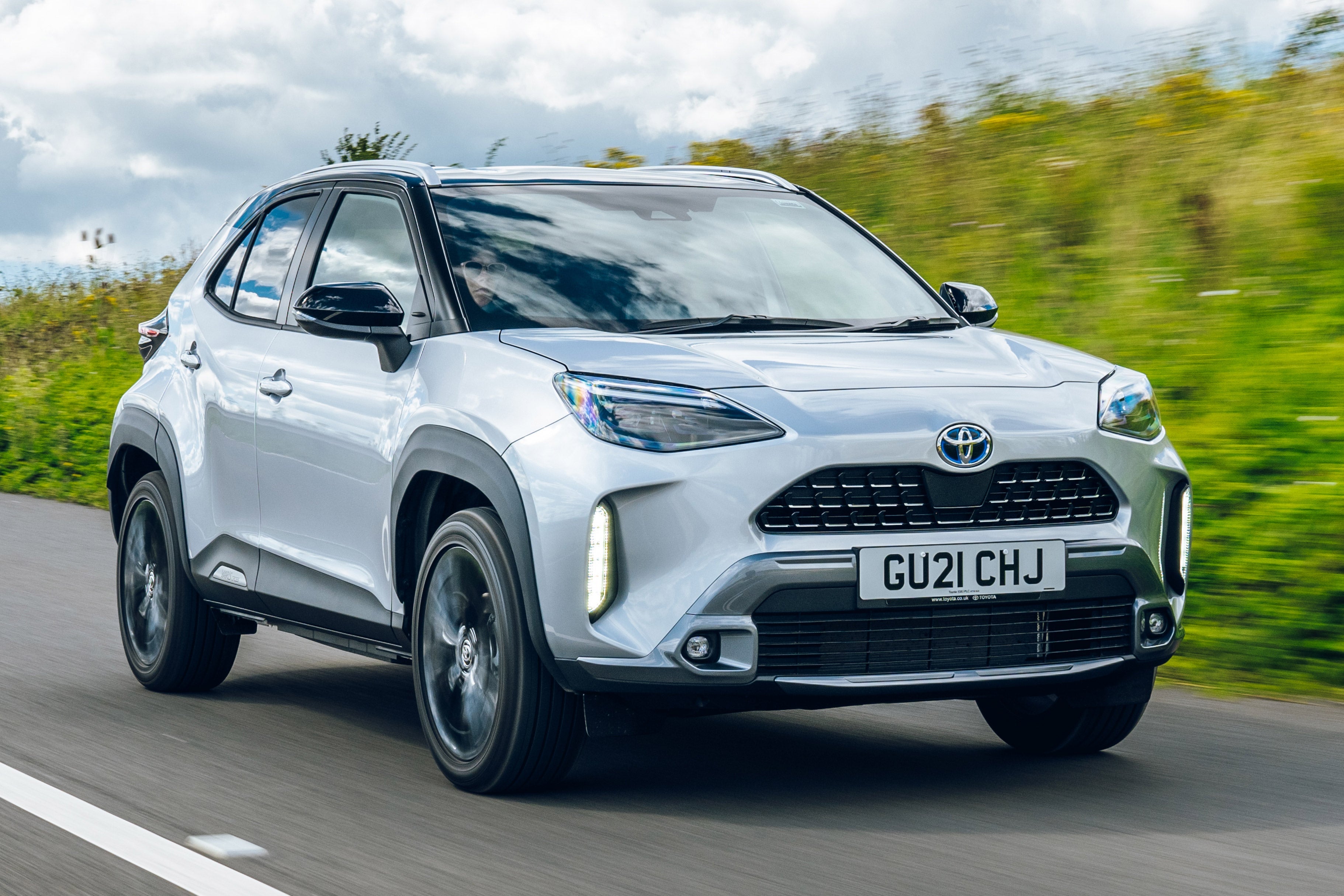Toyota Yaris Cross Review 2025: Price, specs & boot space
Written by Andrew Brady
Quick overview
Pros
- Efficient hybrid power means it'll be cheap to run
- Stylish exterior
- Likely to be very reliable
Cons
- A bit pricier than alternatives
- Not the most spacious small SUV
- Ride is a little firm
Overall verdict on the Toyota Yaris Cross
"Sharing so many parts with the latest Toyota Yaris hatchback, there's no way the Yaris Cross could have been anything less than excellent. It's fun to drive, has a solid interior and comes fully-loaded for the money."
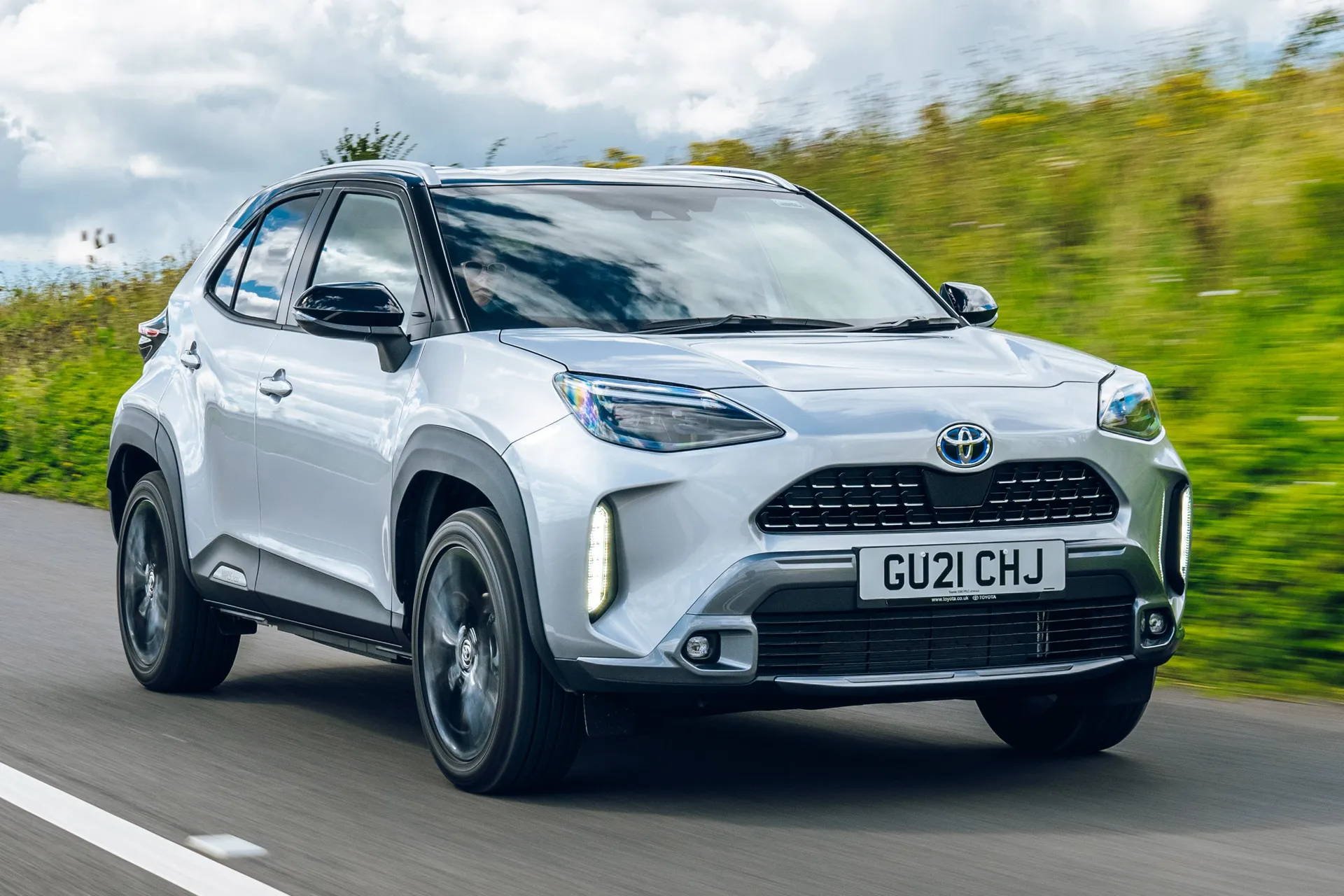
The most impressive thing about the Toyota Yaris Cross is its efficiency: its petrol-electric hybrid powertrain means it's as cheap as chips to run.
While it shares a name with the popular hatchback, the Toyota Yaris Cross is a small SUV alternative to the Nissan Juke, the popular Ford Puma and the good value Skoda Kamiq. It's not the first time Toyota has had offered a car of this size: it's actually similar in dimensions to the original RAV4, not to mention the long-forgotten Urban Cruiser. Toyota certainly has plenty of know-how selling SUVs, and we'll explore how this latest model stacks up in our Toyota Yaris Cross review.
Hybrid powertrains are very much Toyota's forte and the Toyota Yaris Cross is offered exclusively with a petrol-electric drivetrain. This combines a little 1.5-litre petrol engine with an electric motor (two in the case of the four-wheel-drive model). Performance is brisk around town, while its ability to run on electric power means refinement is impressive. Read our guide to the best hybrid SUVs to find out more.
On the open road, it's not quite as agile as a SEAT Arona or Ford Puma, but it's still enjoyable to drive. The engine runs out of steam when pushing motorway speeds, but it can hold its own against 1.0-litre alternatives.
Prices start from around £25,500, which makes the Toyota Yaris Cross appear a bit expensive compared to some rivals. That's reflective of its innovative hybrid engine setup, though, as well as its high levels of standard kit.
Buyers get a choice of Icon, Design, Excel, Dynamic and Premiere Edition trim levels. The mid-range Toyota Yaris Cross Design is the big seller, with standard equipment including a touchscreen media system (with Apple CarPlay and Android Auto), LED lights and 17-inch alloy wheels.
All models feature a stylish yet functional interior, with enough space to transport a pair of adults and their luggage. It's not really up to the job of acting as your main family car, though: the rear seats feel quite cramped, while access isn't that easy. The boot is competitive, but not as big as a Nissan Juke or Ford Puma's. You'd be better looking at the bigger Toyota RAV4 if you need a family SUV.
Looking for a used car for sale? We've got 100s of Toyota Approved Used Cars for Sale for you to choose from, including a wide range of Toyota Yaris Cross models for sale.
Is the Toyota Yaris Cross right for you?
The Toyota Yaris Cross is an ideal choice for a trendy urbanite who wants a car that looks great but won't cost a fortune to run. Toyota's reliability record is almost unbeatable, while the interior of the Yaris Cross is much better than you'd expect from the brand in relatively recent history. It's not quite as sporty as a Ford Puma, though, while alternatives like the Skoda Kamiq are cheaper to buy.
What’s the best Toyota Yaris Cross model/engine to choose?
There's only one engine available: the 1.5-litre hybrid unit that also features in the standard Toyota Yaris. Initially it had 116PS, and in 2024, another version was added to the range that gave 130PS. The latter is marginally quicker, but you'll do well to notice the difference in everyday driving. Both can be had with front- or four-wheel drive. We'd recommend sticking with the two-wheel-drive model, unless you really need the extra grip provided by the four-wheel-drive Yaris Cross AWD-i.
In terms of trim level, around 50% of buyers will opt for the mid-spec Design. This makes sense as it strikes a good compromise between desirable kit and value for money, with standard features including 17-inch alloy wheels, an touchscreen media system and a reversing camera. Don't dismiss the entry-level Icon, though: it's well kitted out for the cash, while pricier models look a bit flashier.
What other cars are similar to the Toyota Yaris Cross?
The small hybrid SUV market is growing. The Hyundai Kona Hybrid is a good alternative, and so is the Honda HR-V. You might also consider the plug-in hybrid Renault Captur E-Tech, or electric alternatives like the Peugeot e-2008. If you're not too fussed about hybrid power, we rate the Ford Puma highly (it is available as a mild-hybrid), as well the Skoda Kamiq and Volkswagen T-Cross. Further rivals include the Nissan Juke, Hyundai Bayon and Kia Stonic.
Comfort and design: Toyota Yaris Cross interior
"With its stepped dashboard and three-spoke steering wheel, the Toyota Yaris Cross looks and feels an awful lot like the hatchback on which it's based."
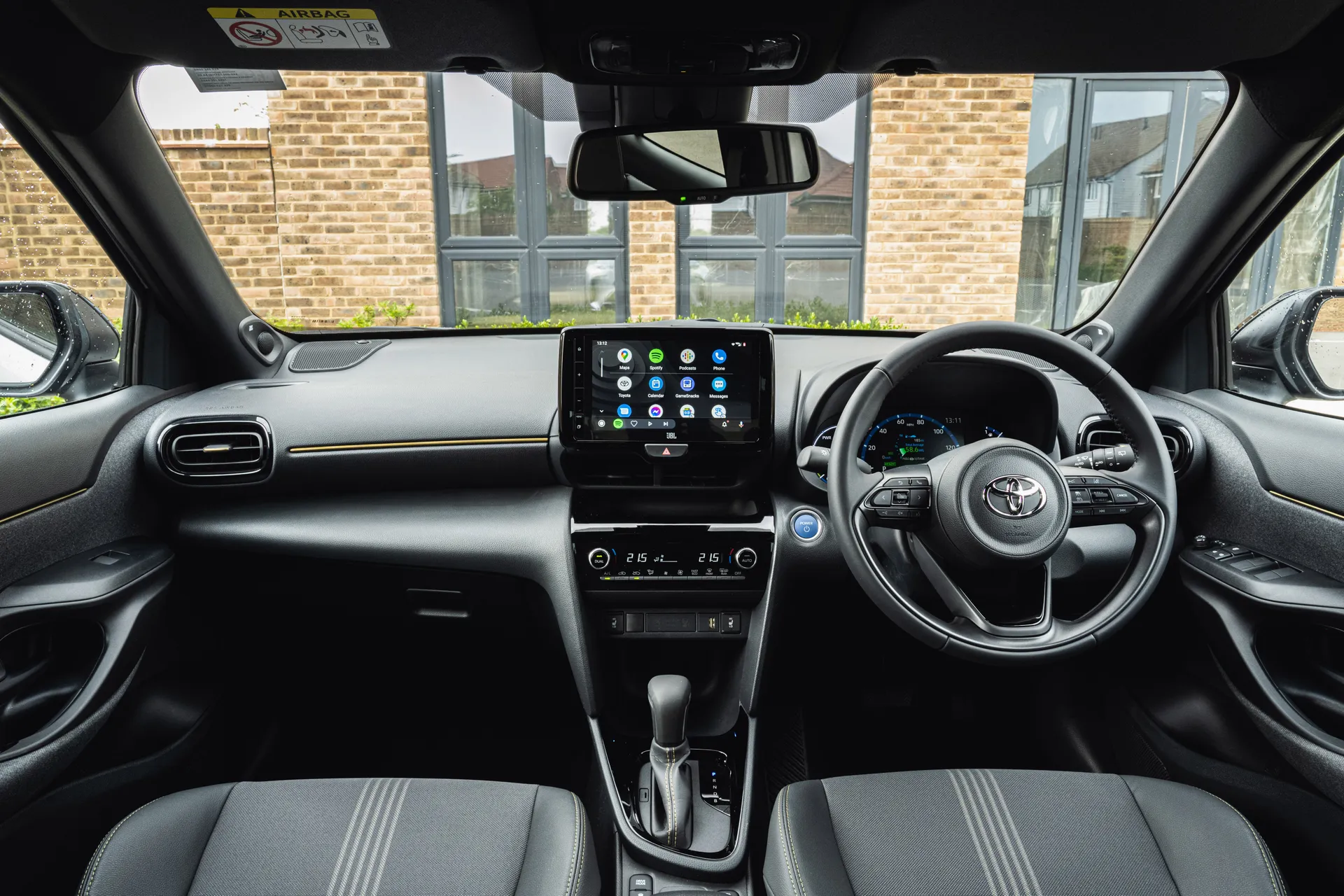
While it might lack the flair inside of a Peugeot 2008, the Yaris Cross has a perfectly functional interior that looks just as smart as a Volkswagen T-Roc's. The climate control system is easy to operate, thanks to useful switches on the centre console (no having to traipse through the infotainment to turn the heating up), while everything else is pretty much exactly where you'd expect to find it.
You'll need to crank the seat up if you want a high SUV-like seating position, but it's noticeably higher than the standard Yaris (and even compared to rivals like the Skoda Kamiq). All models come with manual height adjustment on the front seats, although you'll need an Excel or above for power-adjustable lumbar support on the driver's seat.
Quality and finish
There are certainly some robust plastics in the interior of the Yaris Cross, particularly low down in the cabin. The dashboard feels firm to touch, while things like the interior door handles are quite scratchy. The centre console is pretty hard, too, if you're unfortunate enough to bang your leg on it while driving.
That said, this approach means it feels like the cabin will take decades of abuse. We suspect a 10-year-old Yaris Cross will look broadly the same inside as it did when the original owner took delivery.
Infotainment: Touchscreen, USB, nav and stereo in the Toyota Yaris Cross
On early models, Icon and Design models used an eight-inch media system, while higher-spec trim levels got a bigger nine-inch display with sat-nav as standard. We sampled the smaller display and it's pretty good, certainly much better than Toyota's infotainment systems of old, with logical menu layouts and quick responses.
It's worth noting that the smaller unit comes with a few physical shortcut buttons, which makes navigating the system easier, rather than being reliant solely on touchscreen. Only the bigger display comes with sat-nav, but Apple CarPlay and Android Auto are standard across the range. That means you can use apps from your phone for navigation. Most Yaris Cross models come with a seven-inch digital instrument cluster, while a 10-inch head-up display is offered only on the Premiere Edition.
An update in 2024 changed things a little. Entry level Icon trim got a 9.0-inch central screen while the rest of the range was given a 10.5-inch item with navigation (cloud-based on the Design grade, built-in on the rest). In terms of driver instruments, the Icon and Design grades have a 7.0-inch combimeter, while the higher-grade Excel, GR Sport and Premiere Edition cars have a bigger and more customisable 10.5-inch digital display.
Space and practicality: Toyota Yaris Cross boot space
There's a reasonable amount of room in the front, while it's easier to get a comfy driving position than in something like the Peugeot 2008. There's space in the armrest to store your phone (and that's about it), while you won't get much more than a small water bottle in the door bins. The glove box is quite compact, too.
Getting in and out of the rear feels a bit awkward, due to rear doors which don't open particularly wide. Once in there, it feels quite cramped and claustrophobic. Adults will find their knees touching the seat in front, while kids might find that the rising window line brings on travel sickness. There are ISOFIX child seat mounting points on the outer rear seats, though.
The boot is wide and deep, although there is a serious lip, which will make loading heavy items tricky. Excel, Dynamic and Premiere Edition models come with a false floor that reduces this, as well as providing some useful concealed storage for hiding things away.
The boot space of the Yaris Cross means you can carry up to 397 litres of luggage, which is slightly less than in a Nissan Juke, Renault Captur or Ford Puma. The rear seats drop easily, though, providing up to 1097 litres of space when required.
Handling and ride quality: What is the Toyota Yaris Cross like to drive?
"Our Yaris Cross Design test car with its 17-inch alloy wheels seemed to have a tendency to patter over broken road surfaces, but it's no firmer than a Ford Puma. You might want to avoid the higher-spec models with their 18-inch alloys if you're after a really comfortable small SUV, or even better, look at the Skoda Kamiq instead."
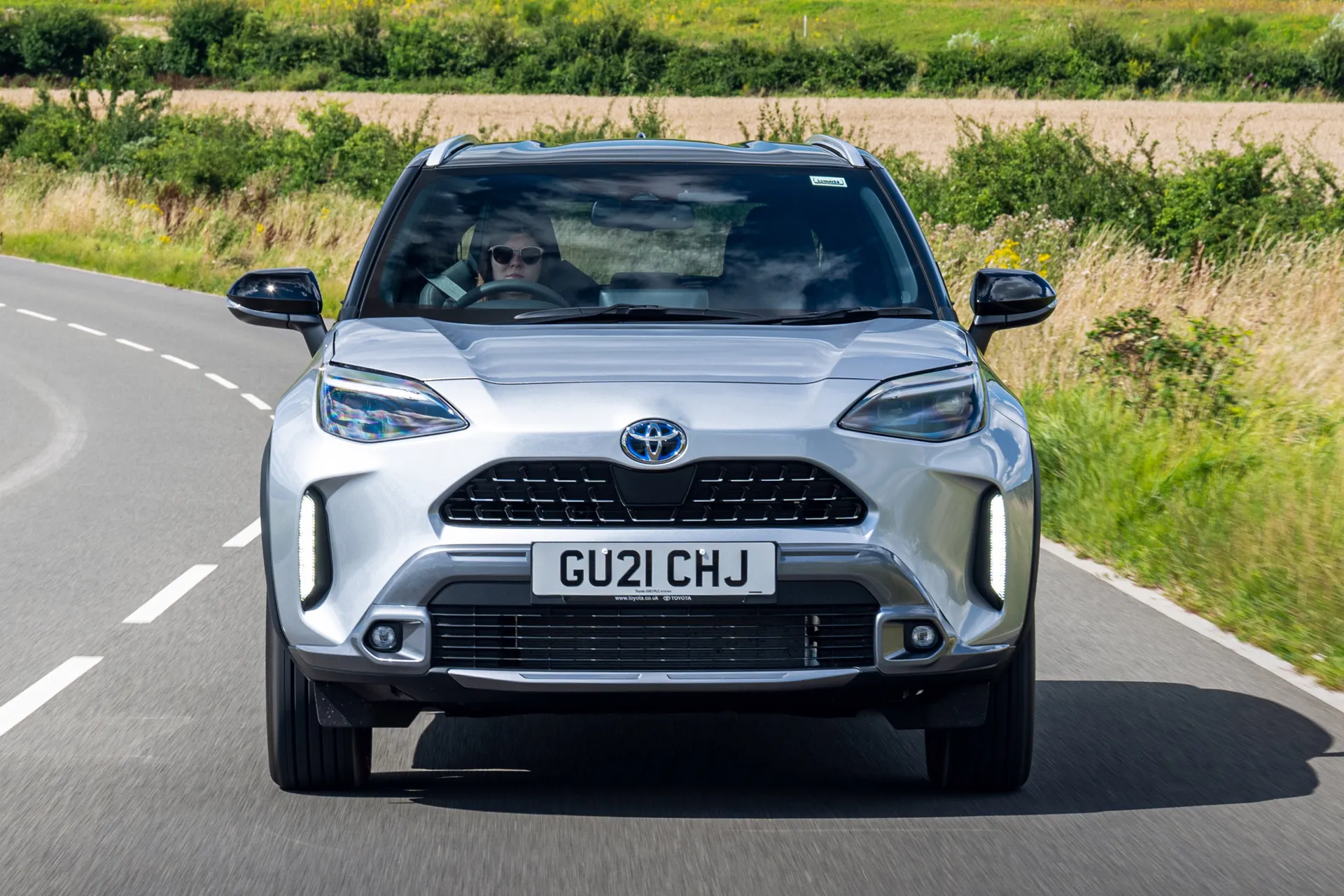
It's surprisingly fun to drive, though, responding eagerly to steering inputs and not wallowing about too much for a small SUV. Its light steering means it's not as fun to drive quickly as a Ford Puma or SEAT Arona, but that's fine in a car that's more at home in the city.
With a 25mm increase in ride height over the standard Yaris, you'll enjoy a good view over other traffic. The Yaris Cross's compact dimensions mean parking is fairly easy, although rear visibility isn't that great. Fortunately, a reversing camera is standard on all Yaris Cross models.
What engines and gearboxes are available in the Toyota Yaris Cross?
Initially, all Yaris Cross models used the same hybrid drivetrain as in the Toyota Yaris. This uses a small 1.5-litre petrol combined with an electric motor to drive the front wheels, giving 116PS. It feels sprightly enough in urban areas, where the hybrid setup hides any of the usual lag you'd expect from a small petrol engine. It'll take a fairly leisurely 11.2 seconds to reach 62mph (11.8 seconds in the AWD-i), though, while the CVT automatic gearbox will discourage you from purposeful acceleration.
In 2024, a second option joined the range. The 116PS powertrain was maintained for most models, but the high-end GR Sport and Premiere Edition model were given a more powerful 130PS version of the same powertrain, with the extra power coming from an upgraded electric motor. Against the stopwatch, it trims half a second off your 0-62mph time, but in reality, you'd struggle to detect the extra power in any given driving situation.
There are a variety of drive modes to pick from, including Eco, Power and a setting marked 'B', which ramps up the regenerative braking, causing the Yaris Cross to slow down more when you lift off the accelerator. We found ourselves using this latter mode a lot: not only does it make for more relaxed driving, it also helps with fuel economy.
There are four-wheel-drive versions of both powertrains - known as the Yaris Cross AWD-i (intelligent all-wheel drive) - which use an additional electric motor to power the rear axle and provide a little extra traction when required. These sell in relatively small numbers, though.
Refinement and noise levels
The hybrid powertrain stays quiet if you're very gentle with it. However, if you ask for even moderately brisk acceleration, and the CVT transmission sends the engine revs soaring and it emits a raspy, buzzy sound. However, it's not as irritable as CVT gearboxes from a few years ago, and it is at least possible to drive around this by keeping your throttle inputs light and adopting a more relaxed approach to your driving.
There's a bit of road- and wind noise, too, but generally the Yaris Cross is quite a civilised car. That's particularly true around town, where the engine can switch off entirely and you can bimble about under electric power.
Safety equipment: How safe is the Toyota Yaris Cross?
All Toyota Yaris Cross models come with the firm's active safety and driver assistance systems as standard. These are intended to warn the driver and avoid an accident in the first place, or at least reduce the severity in the case of an unavoidable collision.
Standard equipment includes a Pre-Collision System which can detect other vehicles, pedestrians (during the day or night) and cyclists. There's also a Lane Departure Alert system, Automatic High Beam and Adaptive Cruise Control. On Excel, Dynamic and Premiere Edition models, the Yaris Cross also comes with Blind Spot Monitor and Rear Cross-Traffic Alert systems.
Euro NCAP crash-tested the Toyota Yaris Cross in 2021, and it achieved the maximum five-star rating.
The 2024 update saw a raft of improvements to the driver assistance tech on board, with new systems added and existing ones enhanced.
MPG and fuel costs: What does a Toyota Yaris Cross cost to run?
"As a hybrid model, the Toyota Yaris Cross is one of the most fuel efficient cars in its class. Depending on trim level, you'll see up to 62.8mpg in day-to-day driving from the 116PS model."
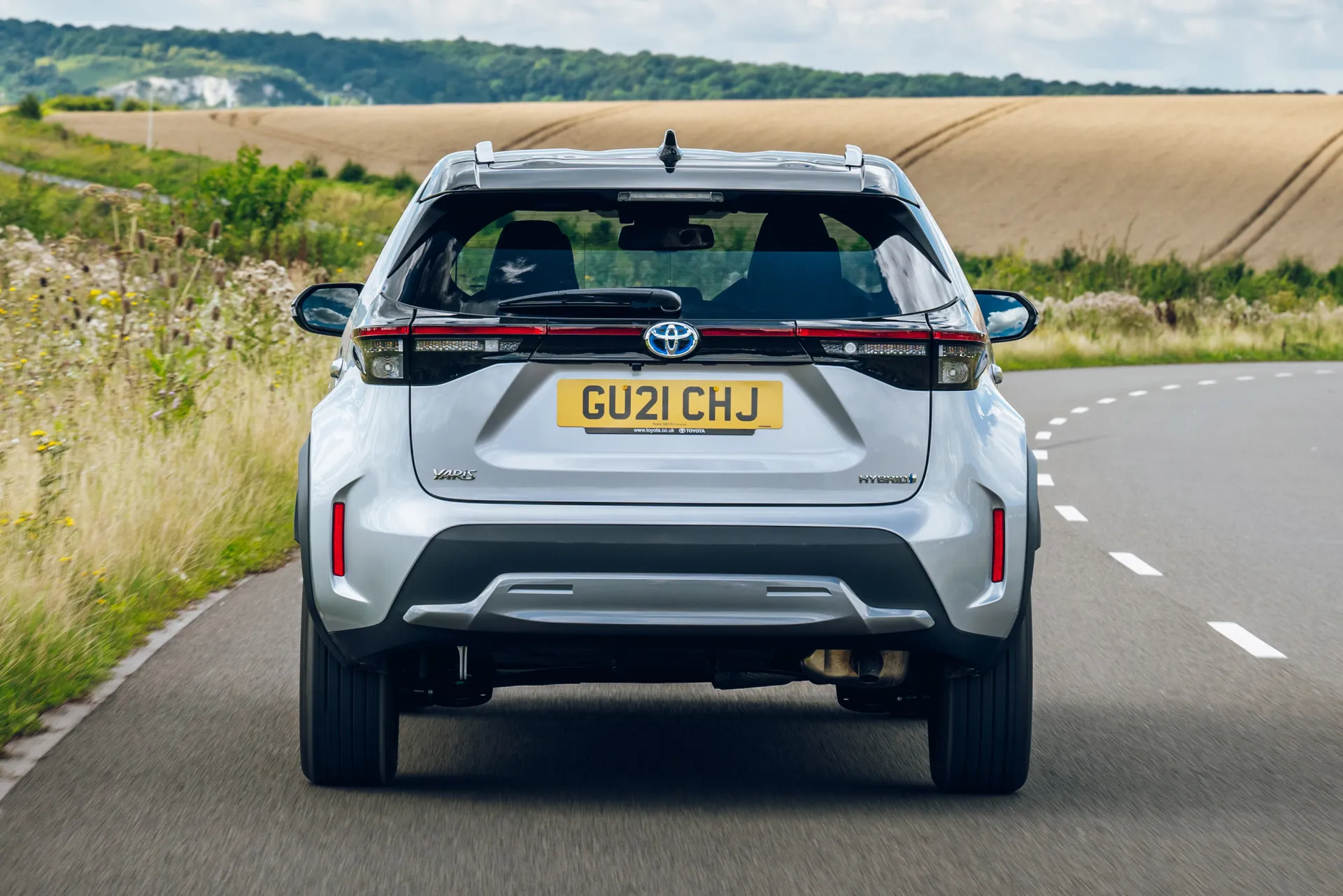
That's according to WLTP fuel economy tests, but Toyota has good form for making fuel-sipping vehicles that get pretty close to their official figures in the real world. On our hilly test route, without any particular effort (apart from arduous use of the B-mode), we were comfortably seeing mid-50s MPG.
The 130PS version of the same drivetrain is a little juicier, but not by that much. WLTP figures stand at between 56- and 58mpg.
The only way you're going to find a small SUV that's cheaper to run is by looking at electric alternatives like the Hyundai Kona Electric or DS 3 Crossback E-Tense.
Insurance groups and costs
The Toyota Yaris Cross Icon is in insurance group 11, while most other models are classed as 12 or 13. Cars with the more powerful drivetrain creep up to group 14. That's comparable to alternatives and means the Yaris Cross shouldn't cost a fortune to insure. As ever, though, it's worth shopping around for quotes, particularly if you're a young or inexperienced driver.
VED car tax: What is the annual road tax on a Toyota Yaris Cross?
As an 'alternative fuel' car (i.e. a hybrid), you'll save £10 a year on your annual tax bill. That means it'll cost you £180/year to tax the Toyota Yaris Cross after the first year. That's the same as rivals like the Hyundai Kona Electric and upcoming Honda HR-V.
How much should you be paying for a Toyota Yaris Cross?
"If buying brand new, prices start from around £25,500 and top out at around £35,000."
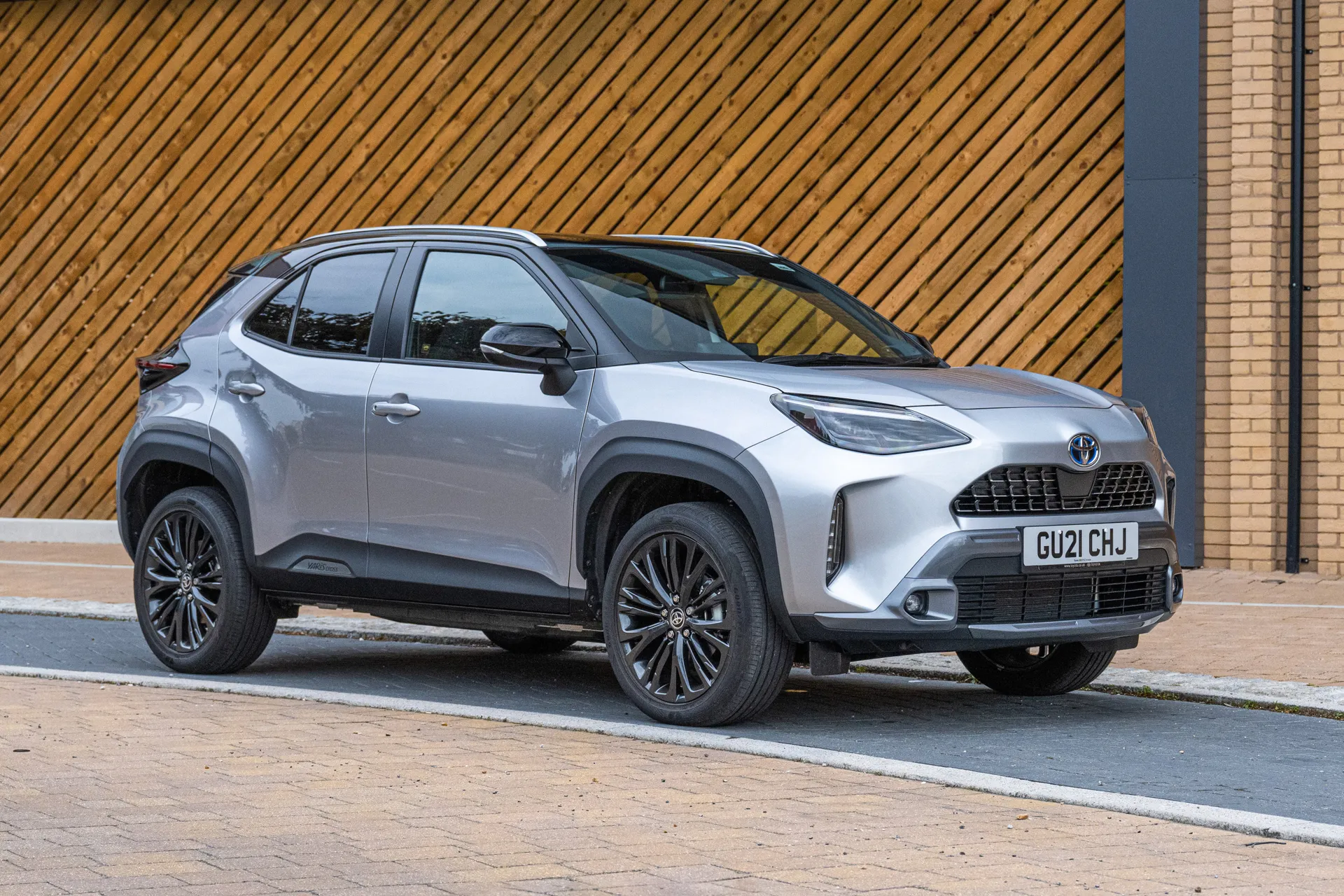
Browse the heycar listings, though, and you'll find a huge choice of tempting used examples, in a variety of trim levels with a variety of different mileage options. A budget of just over £18,000 will get you an Icon or Design model from 2021 or 2022 with around 40,000 miles on the clock, and that's a very decent saving on what is still a relatively new car.
If you fancy something a little fresher, year-old cars with four-figure mileages can be had for not much more. Budget around £20,000 for one of those.
Trim levels and standard equipment
The Toyota Yaris Cross range kicks off with the Icon trim level. This is well equipped for an entry-level model, with standard equipment including 16-inch alloy wheels, a touchscreen media system (with Apple CarPlay and Android Auto), and a reversing camera. Intelligent adaptive cruise control is standard, as well as a pre-collision system with pedestrian and cyclist detection.
Then there's the Design trim level, which builds on the Icon with 17-inch bi-tone alloy wheels, LED headlights, aluminium roof rails and privacy glass. Inside, you get blue ambient lighting and 40:20:40 split-folding rear seats.
The Toyota Yaris Cross Excel adds 18-inch alloy wheels, a kick-activated power tailgate, heated front seats, a heated steering wheel and intelligent front/rear parking sensors.
Highlights of the Dynamic model (later renamed GR Sport) include a black bi-tone roof, power-adjustable lumbar support (on driver's seat), 18-inch dark grey alloy wheels and racier styling.
The Toyota Yaris Cross Premiere Edition features 18-inch bi-tone alloy wheels, black leather seats, a JBL premium sound system, 10.0-inch coloured head-up display and heated front seats.
Ask the heycar experts: common questions
Is the Toyota Yaris Cross a self-charging hybrid?
Is the Toyota Yaris Cross an SUV?
How expensive is a Toyota Yaris Cross?
Get our latest advice, news and offers
Keep me updated by email with the latest advice, news and offers from heycar.
By submitting you agree to our privacy policy
